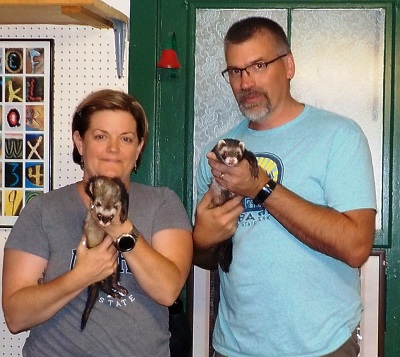
|
Rosey & Rufus
• Surrendered to the Shelter on September 29, 2018. They found a Forever Home September 7, 2019! |
January 13, 2024:
We are good. Rufus is doing great! Rosey has never accepted him back. She's mostly blind so I think that has a lot to do with it. We've given up trying as it seems to cause Rufus a bit of heartbreak each time she attacks him...
The tale of a ferret with a pacemaker. We now affectionately call him our RoboFert.
Backstory: Rufus is a 7yo male sable that we adopted along with his cage-mate Rosey in 2019. Rufus and Rosey were surrendered by their previous owner. Rosey seemed to need my husband and caught his attention at the shelter by jumping at him from the other side of a divider. She was quite determined. We thought that was generally adorable and after careful thought and planning, decided to add them to our family. Rufus turned out to be the sweetheart of the duo. He is very interactive, sweet, loves kisses and face massages, he even supervises cage cleaning. We love him dearly. It all started on a Sunday night. We released Rufus and Rosey for their evening run. Rufus seemed fatigued. He typically can scale a full flight of stairs without difficulty but that night, he got up 1 to 2 steps and then had to rest. I brought him off the stairs, despite his determination to scale them. On flat ground he didn't do much better. He made multiple rest periods and felt cold. I gave him some linatone then duck soup then karo syrup thinking it was a low glucose event. We also had some prednisone in the house and gave him a small dose. A little while later he climbed the flight of stairs but still seemed tired.
As he seemed better, we decided to see how he did overnight and call the vet Monday morning. Overnight he did ok so we gave him more soup. We called his vet however she was not going to be in for the entire week so we called Cornell Vet Hospital. We were able to get him an appointment and rushed him up there. They took him in to evaluate him and called a couple hours later. He was diagnosed with a list of things but the primary diagnosis was 3rd degree AV heart block. His atria (the upper chambers of the heart) were beating at about 200 beats per minute (bpm) and the ventricles (the lower chambers of the heart) were beating at 20-30bpm. His average heart rate was 40-50bpm and was supposed to be 200 - 250bpm. This is not a heart rhythm that is compatible with life because the upper and lower chambers are not in synch or talking to each other at all. Sudden cardiac death is a real possibility with this diagnosis. The only reasonable way to survive is to place a pacemaker so we needed to decide quickly if he would get one or not. There is a medication that may help (but not cure) 3rd degree block however its very hard to find, Cornell doesn't stock it, and it cost around $275 per day. He wasn’t stable enough to undergo surgery so we had at least 24 hours to decide. For reference: about 11 ferrets have had pacemakers placed in the U.S. One of his doctors practiced in Europe for a while and told us that is more common in Europe than in the US. If Cornell placed a pacemaker, Rufus would be the only the 2nd ferret to have the procedure at Cornell.
Other findings were a possible blockage in his stomach and a spot on his pancreas but they didn't think it was insulinoma as his blood sugars were stable. His calcium level was low and potassium was high so they needed to correct that also. He had also lost 20% of his total body weight so this must have been going on longer than we realized. The unknown item in his stomach was the least of his worries.
They started a slow conservative fluid resuscitation overnight but it didn’t do much to help so in the morning they began a more aggressive approach. If they resuscitated too quickly they would possibly cause pulmonary edema or heart failure so this was a careful dance. The entire time, his heart stayed in 3rd degree heart block, so we knew at any time that he could perish from that alone.
Finally the next day, the aggressive fluid resuscitation seemed to pay off. He was more alert and was eating and drinking a little, but only just a little. His heart rate improved some to 70-80bpm which was better, but not enough to support ferret life long term. His heart rhythm would change to an escape rhythm but the underlying rhythm remained 3rd degree block. They continued this for a couple days and he improved very slowly. His repeat blood work was improved and they then determined he was stable enough undergo surgery.
In the meanwhile, we researched more on ferret pacemakers and survivability with regards to the intraoperative and also postoperative period. Turns out ferrets do fairly well with this surgery. Median survival was 24 months. There are a couple articles about ferrets and pacers and the survivability was promising, even for an older ferret. He would need to be operated on by the head of exotics, his supervising veterinarian, and the soft tissue team, all working in conjunction with the cardiology team.
We discussed the details and decided that he was a good candidate despite his advanced age. He had always been very active, climbing the stairs multiple times a day, and healthy, right up until the sudden illness. We knew he needed a chance so we decided to go ahead with the surgery. Surgery was a success. The pacemaker was in place and working well. Heart rate was 140 (the maximum it can go), which is still slow for a ferret but significantly improved over 40 or even 80 that his heart was performing at. The cyst on the pancreas was removed and was likely an early insulinoma so we were so very grateful for that. The item in the stomach was removed and turned out to be a bezoar, which is a collection of debris (his was partially fur) that congeals to be rock-like. We got to see it and it was impressive.
His postoperative period had some hiccups... He had some blood in his stool so was started on sucralfate and omeprazole to settle his digestive system. It isn’t unusual for ferrets to develop stomach/gastrointestinal ulcers in stress situations. The blood stopped and he was continued on these meds thru discharge. He initially was active and then became more fatigued and down in the dumps without any obvious cause (labs were good, he was eating and drinking and eliminating well, heart was stable). We instinctively knew he needed to see us – he needed to know he hadn’t been abandoned again, needed to know his humans loved him and missed him too. Ferrets need their people, they need to know their humans care about them or they don’t thrive or do well. We went to visit him the next day and took an old tshirt of my husband’s to keep with him and a blanket from his cage-mate. He perked up significantly while we were there so we visited again the next day too. He showed good signs of improvement and there was talk of him coming home the following day.
He developed a fever but this was related to the opioids for pain control and once they were switched to another type this resolved.
The most interesting finding was his heart started beating at around 200bpm on its own without help from the pacer! This rate is above what the pacer does so it waits until it senses a heart rate lower than 140 and will restart – its an “on demand” type of pacer. It’s possible that he had some myocarditis or infection of the heart muscle that was contributory to the heart block condition and the empiric antibiotics that they were giving helped with that. It was impossible to tell which came first but we knew that if his heart was going to reverse to the block, his chance of survival was now very good because the pacemaker would beat for him if his couldn't figure out the right thing to do.
We brought him home on a Monday after his surgery the Thursday prior. He has done very well. The hardest part was not allowing him to walk or play for 1 month. He was on strict physical limitations until his checkup. He had multiple medications twice daily for about a week then just one for 3 more weeks. He has been a champ throughout!
One of the hard things for him was his cage-mate has not accepted him back. We knew this could be an issue. We have tried various things but don’t hold much hope that we will ever be able to leave them alone together again. She has her own health issues, blindness, cutaneous lymphoma, adrenal disease (though she has the Lupron implant). Time will tell. His one month checkup went well. His pacer was evaluated and come to find out it is turning on during his sleep cycles but doesn't need to run during wake cycles. He has gained back his lost weight. His fur is growing back too!
Overall, we are very grateful to his team at Cornell Veterinary Hospital and especially Dr. Adam Moreno, DVM and Dr. Nicola Di Girolamo, DVM, PhD, DACZM, DACVPM.
February 5, 2023:
Hiya! Hope this email finds you well. Nothing new here- just busy with the new job. Rosie and Rufus are doing fine.
March 21, 2020:
We are all good here. Work is stressful as things are changing alot - sometimes hourly. Right now I feel like we are in the eye of the hurricane and the next wave is coming. So far we've all managed to stay fairly healthy. I had what was likely the flu in feb, roland brought a cold back from a work trip but so far... so good. We're social distancing and washing hands & phones. Hope you're doing well? The fuzzy babies continue to bring tremendous joy to our hearts. They've been doing very well and are playing with the dog. He enjoys them too.
Shelter Response: Good morning, I bet it is stressful. Ugh, we have 2 of our volunteers under 14 day quarantine. Same here, we have suspended all volunteer and shelter visits for the time being. I'm doing my best to stay well. I'm pleased - we have 17 ferrets on medication at this time, that is keeping me really busy. I'm still on medical leave, that helps me keep me up here. . Take care of you and the crew please. Brenda
January 2, 2020:
Rosey and Rufus are doing great and have made our lives so much fuller! Roland is being a great dad and taking point for the majority of their care. They're so so funny!!
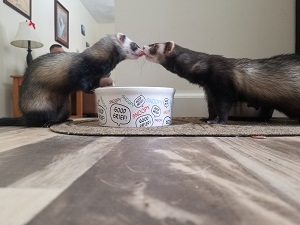
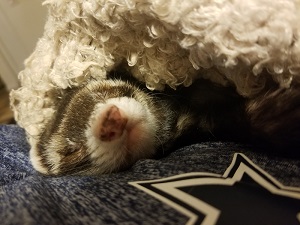
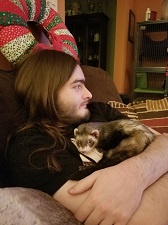
Christmas, 2018:
Dear Miss Debbie and Mr. Butch - Mum let us get into the presents you sent us. She took lots of pictures of us checking them out! Thanks so much for helpen Mum take care of us. See us looking over our presents!
God Bless you.
Rufus and Rosey
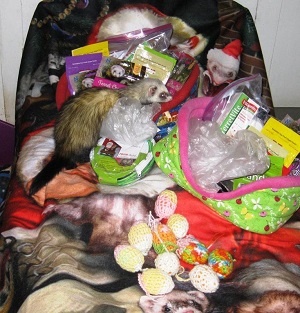
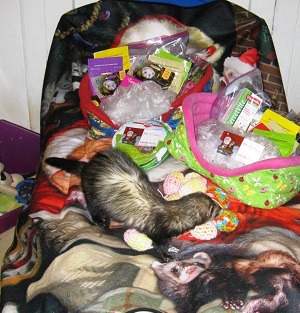

October 21, 2018:
Rufus and Rosey can't be trusted in many of the rooms, Rufus is as bad as Shy and Big Mike. Mostly they get the porch and window end. Fortunately the weather has been awesome for the kids to use the porch.
October 13, 2018:
Rufus and Rosey are problem children Rufus gets over just about every barrier there is, he and Rosey only get the rooms the other problem children get.

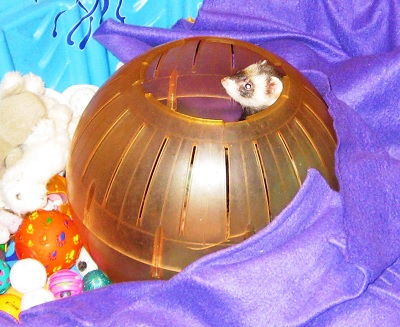
Initial Contact, September 18, 2018:
Hi my name is Kate, I’m a licensed veterinary technician and one of my fellow co-workers mentioned your page. In March I adopted two ferrets from Jen’s Exotic Pets, they came with a slew of toys and a nice 3 tiered standing cage. Unfortunately I have to move in October and my new landlord won’t allow me to bring the ferrets. I’m a single mom working full time and would love nothing more than to give them the forever home they deserve but it’s becoming more challenging as time passes. I have never had to rehome any of my companions so this is a difficult thing for me. Both are up to date on vaccines and on flea meds. Their so sweet and loving. There’s a male, Rufus & a female Rosey. They’re litter mates and hope they can stay together. I was reaching out to see if your rescue could help me find them their forever home. Both are sable in color and just over one year of age. Please let me know if you can help me find them a good home. Thank you, Kate